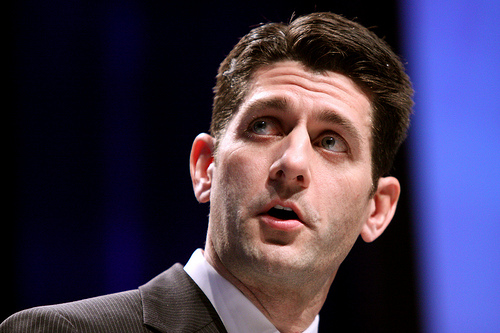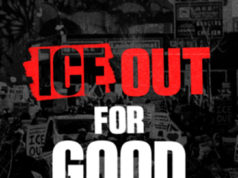Two days after Paul Ryan’s acceptance speech at the Republican National Convention, it’s abundantly clear that most everything he said was bunk.
And this, we are led to believe by an A-section New York Times article, is apparently surprising. As the front-page teaser reads: “Falsehoods in Paul D. Ryan’s speech may be a sign of lack of concern with fact-checking.”
As the political analyst Michael Cooper writes:
The two speeches — peppered with statements that were incorrect or incomplete — seemed to signal the arrival of a new kind of presidential campaign, one in which concerns about fact-checking have been largely set aside…
The growing number of misrepresentations appear to reflect a calculation in both parties that shame is overrated, and that no independent arbiters command the stature or the platform to hold the campaigns to account in the increasingly polarized and balkanized media firmament. Any unmasking of the lies or distortions, the thinking goes, rarely seeps into the public consciousness.
It’s safe to say — and has been for some time — that extremism and large-scale mendacity are fully, almost casually, mainstream. Cooper has a point, certainly, that Paul’s many falsehoods may represent a new (low) standard for a candidate as high-profile as the Republican vice presidential nominee, but lies have grown increasingly accepted, even in presidential campaigns, for years, if not decades, with media complicity.
Karl Rove’s successfully propagandized up to a third of voters when Swift Boat Veterans for Truth sunk John Kerry back in 2004. Now we’re supposed to be surprised by Ryan? Because he says himself what previous candidates have simply paid others to say for them?
Despite the media criticism of Ryan following the speech, it will all forgotten in two days (more time than it took the media to move on to gun control debates after a U.S. congresswoman was shot in the head in broad daylight) and no one but liberal columnists will ever bring it up again. When Cooper says the GOP’s “thinking” is that Ryan’s lies will not “seep into the public consciousness,” he’s absolutely right. And so are they.
Perhaps it is novel that the actual candidates are spouting the lies, instead of allowing their campaign ads and political pawns to do it for them, but it’s the natural next step, and one that will become a tolerated, accepted form of political discourse by the time 2016 rolls around.
Just look at the teaser for Cooper’s story. It may be a sign politicians don’t care about fact-checking? The Republican vice presidential candidate slings lie-filled accusations for 30 minutes on national television and the Times in-depth coverage ends up on Page 15 with a teaser so weak that it won’t convince anyone but us journalists to read it. The only things that “seep” into the public consciousness, if they ever start with newspapers at all, begin on Page 1.
The harsher reality is that lying makes as little difference as telling the truth. The media railed about Mitt Romney’s history with Bain Capital for months. They went on and on about his years spent firing employees to make bigger profits for millionaires. What happened? Nothing. The polls shivered and then went still.
The American public, for many reasons good and bad, simply no longer trusts anyone or anything, either people or institutions. And especially the media, which itself bears much responsibility for this deficit of good faith. In light of all that, there is little motivation to try and suss out the truth. It takes so much effort, and few of us are left with either the time or the willingness to expend it. Hell, it’s my day job and it’s hard keeping up with it all.
The result is intellectual exhaustion. Dizzy and confused, we rely on gut feeling. Which is really to say a return to pathos and superstition. This is why Stephen Colbert’s invention of the word “truthiness” during his first show immediately struck such a powerful chord, why it has already entered the lexicon.
Enabled by our leaders and celebrity idols, we change the facts to fit our truth, and in the process, values become catchphrases divorced from any meaningful understanding of the morality supposedly guiding our decisions. That’s why Paul Ryan and all the rest of the evangelizing free-market capitalists can say they believe in both Christian values and Ayn Rand’s self-centered, free-market philosophy, as though the two are not morally opposed in every way.
Ryan is simply the apotheosis of a years-long trend. When he calls Ayn Rand the biggest influence on his thinking, then backpedals when questioned about her atheism, he is forgiven. His beliefs are merely incidental, after all, to his image. Like most political candidates, Ryan realizes that he is not a real person. He is who his political base wants him to be, and changes accordingly.
Presidential candidates have become mirages. They can get away with lying because the lies are not just tolerated, but approved of. It doesn’t matter if it’s true. What matters is that we want to believe them.
Of course, the image can never survive the reality of holding office. Obama set a new standard for passionate image-making, taking Democratic voters so high the only place to go was down. If elected, Ryan and Romney will be the same.
The real problem of such public disengagement is that it fosters a cycle of disappointment and complacency in voters. The more we willingly, even gleefully, fool ourselves into believing in candidates despite a mountain of evidence showing they don’t deserve it, the less we can engage with complex issues and the less our government is a reflection of who we are.
Truth is not the only victim, but our very identity.
Just take the GOP’s unfair ownership of “Christian values.” Ryan and the rest of the GOP can’t uphold Christian values of charity and self-sacrifice and community-building at the same time as radical cuts to Medicare and Medicaid — unless of course they convince the public that they are one and the same.
“Christian values” has become a shibboleth for admission to a group that has no interest in or use for those values. Religion has always changed to fit the needs of the demagogue of the moment, but to convince millions of American Christians that their religion encourages selfish disregard of the greater good is an act of such shameless, bottom-feeding, massive delusion that it makes the paltry character flaws of a given political candidate seem trivial by comparison.
Religious faith is just one example of the perversion of American identity that will continue to grow with our tolerance for liars.
This is a Grand Ole Party, and like all great parties, it’s as much about who’s not invited as who is. When the Democratic convention rolls around, there may be moderately less lying but also less conviction.
Who’s to say which is worse?













“…it’s abundantly clear that most everything he said was bunk.”
No, it’s not – but you’d have to fact-check the fact-checkers to know that – something the tone of your articles suggests you aren’t eager to do But others have, and quite frankly, your lede is not bunk, it’s bullshit. But in all fairness to you and the NYT, you’re just doing your job as cheerleaders and propagandists for the democrat party.
This is why journalism is held in such low regard today. Congratulations, you built that.
“Major media May Not Care About Facts… Whoa, What?!”
To the above commentor, your so stupid you don’t even realize you just proved Mr. McLemor’s point. Thank you!